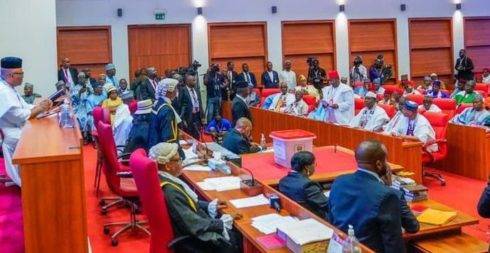A wave of heated debate swept through the Nigerian Senate on Wednesday as Senator Titus Zam’s Bill for an Act to establish the National Animal Husbandry and Ranches Commission for the regulation, management, preservation, and control of ranches throughout Nigeria, and for connected purposes, 2024, passed its second reading.
In his argument, Senator Titus Zam, representing Benue North-West Senatorial District, emphasized the escalating violence resulting from pastoralist-farmer interactions in Nigeria. He stated that these conflicts have escalated to warlike dimensions, threatening national stability. The Senator argued that the Senate must not remain passive while the country suffers from these violent clashes. “As stakeholders in the Nigeria project and elected representatives of the people in the Senate, doing so would amount to abdication of our statutory and leadership responsibilities,” he asserted.
Senator Zam added that past efforts to address the issue were often entangled in ethnic and political biases, leading to widespread resistance. He called for the 10th Senate to unite and address the violent herder-farmer conflicts, which, if left unresolved, could lead to more significant loss of lives and property than the Nigerian Civil War of 1967–1970. “Therefore, the Senator pleaded that now is the time to permanently stop the endless cycle of attacks and counterattacks by our people and their external collaborators,” he concluded.
The Politics of Ranches
The proposed bill includes establishing ranches within the pastoralist’s state of origin, without imposing them on other states or communities that do not have pastoralists as citizens. This approach aims to address critical issues in the livestock business while promoting peaceful coexistence. Experts have praised the bill for tackling one of the country’s most contentious debates. However, the bill has faced opposition from some Northern Senators.
Senator Danjuma Goje criticized the bill, labeling it discriminatory for restricting herders to a specific geographical location. Senator Sulaiman Abdulrahman-Kawu argued that the proposal would violate the constitutional rights of herders, compounding the problems faced by both herders and farmers. Supporting this viewpoint, Senator Adamu Aliero contended that any law restricting the movement of Nigerians and their property would breach Section 41 of the constitution, which guarantees freedom of movement.
The bill’s supporters, however, argue that a structured and regulated approach to animal husbandry could significantly reduce conflicts and foster economic development in affected regions. They believe that creating designated ranches would mitigate the environmental degradation caused by overgrazing and improve livestock productivity.
Balancing Rights and Responsibilities
The debate over the bill highlights the complex balance between safeguarding constitutional rights and addressing the practical challenges of managing herder-farmer relations. Proponents emphasize the need for a solution that respects the rights of all parties involved while addressing the root causes of conflict. They argue that the establishment of the National Animal Husbandry and Ranches Commission is a critical step towards achieving this balance.
Critics of the bill fear that it could exacerbate existing tensions by appearing to favor one group over another. They call for a more inclusive approach that considers the needs and rights of both farmers and herders. Senator Zam and his supporters, however, argue that the bill is designed to be fair and equitable, providing a framework for peaceful coexistence and mutual benefit.
As the bill moves forward, its proponents are urging their colleagues to consider the long-term benefits of a regulated ranching system. They believe that by addressing the root causes of herder-farmer conflicts, the bill can help create a more stable and prosperous Nigeria. The debate continues as the Senate seeks a solution that balances the rights of individuals with the need for national stability and development.
A Rowdy Session in the House of Senate
The bill recently introduced in the Senate has ignited an intense debate among senators, sharply dividing opinions on the floor. Those in favor argued for its potential benefits, while opponents raised significant concerns. The bill, which was forwarded by the Senate Committees on Agriculture, Trade, and Investment, Judiciary, and Legal Matters for further legislative input within the next four weeks, exposed underlying national issues. The session underscored the dangers of echo chambers in public discourse, where opposing sides often fail to engage in constructive dialogue. Analysts have long argued that ranching is among the country’s most contentious topics, reflecting deep-seated divisions within Nigerian society.
These divisions were vividly illustrated by the controversies surrounding former President Muhammadu Buhari’s RUGA initiative. Critics of the plan often cited its failure as a consequence of the nation’s inability to foster mutual understanding on such polarizing issues. The current debate in the Senate mirrors these past challenges, suggesting that without significant efforts to bridge gaps in public opinion, similar initiatives may continue to falter. The emotional responses elicited during the Senate session highlight the urgent need for more inclusive and comprehensive legislative processes.
The RUGA Danger
During the administration of former President Muhammadu Buhari, the government faced considerable opposition due to its perceived mishandling of frequent farmers-herders clashes. In response, it introduced the Rural Grazing Area (RUGA) settlements program, which was intended to address these conflicts. However, the announcement of this program on May 21, 2019, by then Agriculture Minister Audu Ogbeh, was met with widespread outrage and protests across the nation. Many Nigerians, particularly from the middle belt and southern regions, viewed the RUGA initiative as a covert attempt to appropriate farmland, leading to intense public outcry and eventual abandonment of the scheme.
The fierce opposition to RUGA underscored the importance of engaging in proper consultation with key stakeholders. Experts argue that with better communication and more inclusive discussions, the program might have navigated through the challenges of public perception. This historical context makes Senator Zam’s current bill particularly timely, as it comes at a critical juncture—just as the country enters the planting season, a period historically marked by increased clashes between pastoralists and sedentary farmers. By addressing these issues proactively, there is potential to reduce conflicts and promote more sustainable agricultural practices.
The recent Senate debate and the historical context of the RUGA initiative both emphasize the necessity for careful consideration and inclusive dialogue in addressing the complex issues surrounding ranching and agricultural land use in Nigeria. The lessons from past initiatives should guide current and future legislative efforts to ensure more harmonious and effective solutions
Table of Contents
Discover more from OGM News NG
Subscribe to get the latest posts sent to your email.













